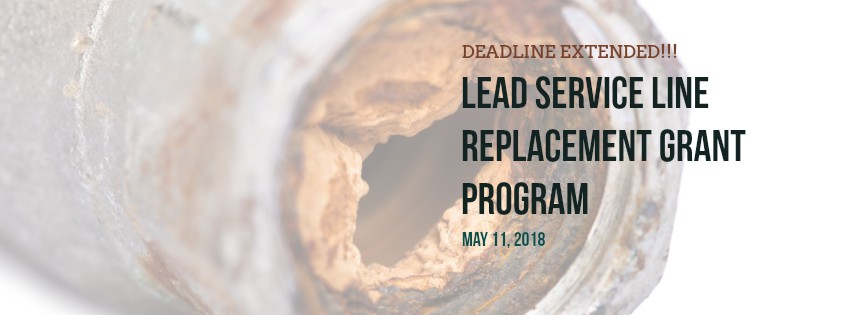Update: Our neighbor Lee asked some additional questions that peaked our interest so we contacted Rhonda J. from the City of Richmond Department of Public Utilities for more information about the Lead Service Line Replacement Grant Program.
A lot of folks like the program but today 4/6 is the deadline, should folks still go through the application?
Good news. The deadline has been extended to May 11, 2018. Thank you for touching base on that!
Can you tell us in a nutshell what the program is all about?
The program provides grant funds for replacement of lead water service lines from the City’s water meter to the exterior of the residential property dwelling.
What is the typical cost of a replacement? (I.e. Is 2500 anywhere close to sufficient for replacement?)
DPU’s experience indicates that most replacements can be completed for $2,500 or less. Factors such as length and size of water service lines as well as any barriers to access play a factor into the cost.
How does this work with multifamily property with or without multiple meters?
At this time, the program only applies to single-family residential units. This can include duplexes with individual water service lines.
There appears to be at least one benefit to having lead service lines – in the event of a frozen water line (common in older buildings with uninsulated crawlspaces and such) I have heard lead pipes are much less likely to burst because lead is softer/less brittle than other materials. Is this true, and, considering the cost of insulating or heating these spaces, is there any other way to mitigate the risks associated with keeping the lead service line? Or any way to preserve this (alleged) benefit while removing the lead?
We follow the EPA’s recommendations in suggesting full lead water service line replacements. For more information about that, click here.
Lead poisoning is often said to be more common amongst renters and in low-income neighborhoods and is now thought to play a much larger role in urban poverty and urban crime rates than previously realized. Has the city given any thought as to how renters and landlords can take advantage of this program or how to make it as easy as possible for folks on a tight budget?
The Grant Program will pay plumbers up to $2500 directly for the cost of replacement, eliminating a large out of pocket expense for the property owner. Informational letters have been sent to those property owners where we have replaced lead service lines on the City side, as they may have the same on their sides. With regard to residents living in apartment buildings, the rules for the Virginia Department of Health grant stipulate residential units. In the future that might become broader but we have to work within the parameters of the current grant. The property owner needs to approve for the work to be done on their property so renters in single-family homes should bring the program to the attention of their landlord and ask them about the type of water line serving their home.
One more question Rhonda, here’s a comment from a neighbor:
When we bought our house in CH, our inspector told us that even if we changed the pipes leading to our house, it really would not matter as the rest of the city’s water pipes are lead. What’s the City’s take?
That is correct. The best practice is to have both sides replaced at the same time. As a practice, the City will replace our side when the customer replaces their side if we are aware and are able to coordinate it. As part of our lead renewal program (a component of our water distribution system), we have always encouraged customers to replace their sides if we were replacing the City side. We are thankful to now have the grant funds that removes the cost burden from the property owner so that we can get more full lead service lines replaced, which is the ultimate goal. Also, because the grant program technically covers this fiscal year we are able to reimburse property owners who had their lead water service lines replaced between July 1, 2017 and present…pending sufficient documentation.
That’s great! Any other programs we should be aware of?
Just FYI…there is another VDH program that I believe will be introduced next week that will focus on lead abatement related to lead paint. The Office of Economic and Community Development will be the lead on that.
Here are some helpful links:


1 comment
I just went through the process. It is pretty painless. You basically have to do the following.
Fill out the initial application.
Get a quote from a plumber (I used Michael and Son, I always use Nathen since I have worked with him before and I will only ever use him since he is one of the few people that are more retentive than me. Michael and sone offer a lifetime warranty on the line.)
Attach the application to the quote and turn it in.
(to stay under 2500, I had the trench hand dug. Local labor is cheaper than the machines they bring in.)
You receive an approval letter that has to be filled out by the plumber.
Then the work gets done. The contractor MUST take photos of the new connection at both ends and show a photo of the old lead lines.
Then the city pays the contractor directly.
Simple process, but SLOWWWWW. It took about 2 weeks for the first approval.
Still, I am not lead free.